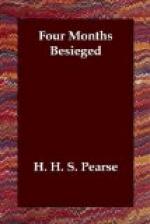As night closes in there are cheers rolling towards us from the plain beyond Klip River, where our volunteers are on patrol. Ladysmith, so quiet and undemonstrative in its patient endurance of a long siege, goes wild at the sound. Everybody divines its meaning. Our friends from the victorious army of the south are coming! All the town rushes out to meet them, where they must cross a drift. The voices of strong men break into childish treble as they try to cheer, women laugh and cry by turns, and all crowd about the troopers of Lord Dundonald’s escort, giving them such a welcome as few victors from the battlefield have ever known. The hour of our deliverance has come. After a hundred and twenty-two days of bombardment—a hundred and nineteen of close investment—the Siege of Ladysmith is at an end. What a hero our gallant old General is to all of us, when he rides forward to greet Lord Dundonald, and how voices tremble with deep thankfulness while we sing “God Save the Queen”!
In a letter written
on the following day, Mr. Pearse describes in
greater detail the arrival
of relief, and summarises his
impressions at the
time:—
LADYSMITH, March 1.—The relieving force joined hands with us last night, and Ladysmith gave itself away to an outburst of wild enthusiasm at the sight of troops so long expected and so often heard fighting in the distance, that some despondent people had almost begun to think they would never come. After the roar of battle ceased on Tuesday, we knew by signs that could not be mistaken that Sir Redvers Buller had gained a great victory even before the heliograph flashed to us the glad tidings in his own words. I had come to the conclusion, watching from Observation Hill, soon after daybreak on Wednesday morning, and seeing the enemy’s convoys in three columns, miles long, trekking northwards, that they were in full retreat. Their guns were hurrying to the rear also, and horsemen in scattered groups, to the number of thousands, were galloping past positions on which some stand might still have been made, a sure sign that they were beaten and did not mean to rally. But the best indication of all was the attempt to remove the big gun from Bulwaan that has shelled us persistently and destructively for a hundred and twelve days, causing us much anxiety but comparatively small loss of life. Our artillery of the Naval Brigade, to which Ladysmith owes a deep debt of gratitude, tried to prevent the guns from being carried off, but apparently their admirably aimed and accurate fire was too late to effect that object.




